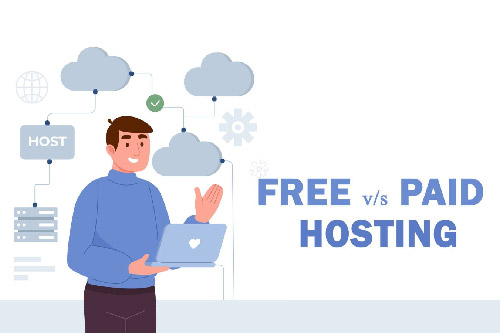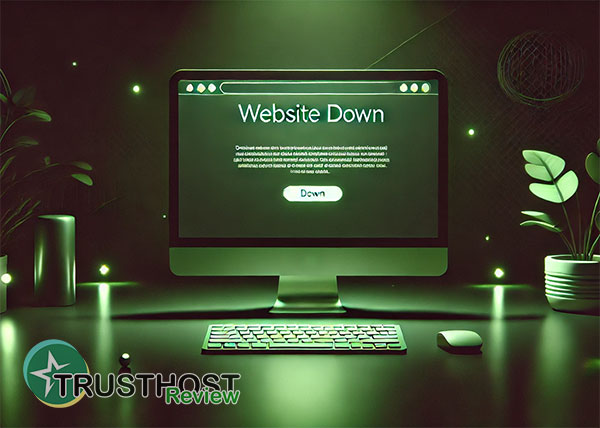What's the Difference Between a Free Host and a Paid Host?
Choosing a web host is one of the most foundational decisions you'll make for your online presence. It's the digital land your website is built on. And just like in real estate, a 'free' plot of land often comes with some serious, non-negotiable drawbacks. While the allure of a zero-dollar price tag is strong, especially for new projects or a small online business, understanding the trade-offs between free and paid hosting is crucial for your long-term success, security, and sanity.

The Tempting Illusion of Free Hosting
Let's be honest: when you're just starting, every penny counts. Free hosting providers capitalize on this by offering a seemingly risk-free way to get a website online. For a student project, a personal blog you share with family, or a simple test site, a free host can seem like the perfect solution. You get a space to upload files and a live URL without ever pulling out your credit card. But for any serious business, developer, or website owner, this is where the dream ends and the potential nightmare begins. The old adage, "If you're not paying for the product, you are the product," has never been more true than in the world of free web hosting.
Free hosting isn't truly free. You pay for it with poor performance, glaring security holes, a lack of control, and ultimately, a damaged reputation. Let's break down the specific costs.
1. Crippling Performance and Slow Site Speed
Free hosting providers cram thousands of websites onto a single, often outdated, server. This means you are sharing a very small pool of resources (CPU, RAM, disk space) with countless other sites. The result is inevitable:
- Excruciatingly Slow Load Times: When server resources are stretched thin, your website will load at a snail's pace. Google has confirmed that site speed is a critical ranking factor. A slow site will plummet in search results and frustrate users, with studies showing that a 1-second delay in page load time can lead to a 7% reduction in conversions.
- Poor Core Web Vitals: Google's Core Web Vitals (CWV) measure user experience, and free hosts almost always fail these tests. Poor CWV scores directly harm your SEO efforts.
- Frequent Downtime: Free servers are unreliable. Your website could be offline for hours or even days without any warning or explanation, making your business look unprofessional and costing you potential customers.
2. Alarming Security Vulnerabilities
This is perhaps the most significant risk. Free hosts have little incentive to invest in robust security infrastructure. They are prime targets for hackers looking for easy prey.
- No Free SSL Certificate: Most paid hosts offer a free Let's Encrypt SSL certificate, which encrypts data between your site and your visitors (the 'S' in HTTPS). Many free hosts don't, or they charge extra for it. Without SSL, browsers will flag your site as "Not Secure," instantly destroying visitor trust.
- Infrequent or Non-Existent Backups: If your site gets hacked or you make a critical error, you're on your own. Free hosts rarely provide reliable, automated backups, meaning you could lose all your work in an instant.
- Shared Server Risks: If another website on your shared server gets infected with malware, the infection can easily spread to your site. You have no control over the security practices of your server-mates.
3. Lack of Control and Professionalism
When you use a free host, you're playing in their sandbox, by their rules. This severely limits your ability to build a professional and functional brand.
- Forced Ads: This is often how free hosts make money. They will place their own ads (for competitors, questionable products, or even their own hosting services) on your website, which you cannot remove.
- Unprofessional Subdomains: You won't be able to use your own custom domain name (e.g.,
www.yourbusiness.com). Instead, you'll be stuck with a clunky subdomain likeyourbusiness.freehost-provider.com. This screams 'amateur' to potential customers. - No Professional Email: You can't set up a professional email address like
[email protected]. You'll be forced to use a generic Gmail or Yahoo address, further eroding brand credibility. - Strict Resource Limits: You'll face tiny limits on storage and bandwidth. Upload a few high-quality images or get a small surge in traffic, and your site will be shut down until the next month.
4. The Support Black Hole
What happens when your site inevitably goes down or you encounter a technical issue? With a free host, the answer is usually nothing. They offer minimal to no customer support. You might find an outdated forum or a basic FAQ page, but you won't have access to a 24/7 chat, phone, or email support team to help you in a crisis. For any business, this lack of a safety net is an unacceptable risk.
The Power of Paid Hosting: A Small Investment for a Huge Return
The good news is that you don't need to spend a fortune to avoid these problems. High-quality, affordable hosting is more accessible than ever. For the price of a couple of coffees per month, you can secure a professional, fast, and reliable foundation for your website. This is why a cheap paid plan is always a better investment than a 'free' one.
1. Superior Performance and Fast Website Hosting
Paid hosts invest in modern server technology and, while shared hosting still involves sharing resources, the server density is far lower and better managed. Providers like Hostinger, SiteGround, or Bluehost offer optimized environments that deliver the fast website hosting you need to rank well and convert visitors. They often include performance-enhancing features like caching, CDNs (Content Delivery Networks), and the latest PHP versions out of the box.
2. Rock-Solid Security and Peace of Mind
The best hosting for small business prioritizes security. A standard paid plan typically includes:
- A free SSL certificate, installed automatically.
- Automated daily or weekly backups.
- Proactive server monitoring and firewalls.
- Malware scanning and removal tools.
This security suite protects your data, your customers' information, and your business's reputation.
3. Full Control and a Professional Image
With paid hosting, you are in complete control. You can:
- Use your own custom domain name.
- Create multiple professional email accounts.
- Install any software, theme, or plugin you need without restriction.
- Access generous storage and bandwidth that can handle your growth.
- Enjoy a clean, ad-free website that is 100% yours.
4. Expert 24/7 Support When You Need It Most
This is one of the biggest differentiators. When you run into an issue at 3 AM, a paid host provides a lifeline. You can connect with a knowledgeable support agent via live chat, phone, or email within minutes. This support is invaluable and can save you hours of frustration and potential lost revenue.
5. Scalability for Future Growth
A good paid host grows with you. When your website's traffic starts to take off, you can easily upgrade your plan from shared hosting to a more powerful VPS (Virtual Private Server) or even a dedicated server with just a few clicks. Free hosts offer no path for growth, effectively capping your potential.
A Tale of Two Websites: A Real-World Scenario
Imagine two entrepreneurs, Alex and Ben, both launching an online store for handmade leather goods.
Alex chooses a free host to save money. His site, alexgoods.freehost.net, is slow to load. Customers often abandon their carts out of frustration. The host places banner ads for cheap, mass-produced wallets on his site, confusing his brand message. One day, his site is hacked, and he discovers there are no backups. He loses weeks of work and customer trust. His business fails to get off the ground.
Ben invests $4/month in an affordable hosting plan. His site, bensfinleather.com, is fast and professional. The included SSL certificate gives customers the confidence to enter their payment details. He sets up a professional email, [email protected], which builds credibility with suppliers. When he has a question about installing a plugin, he uses the 24/7 live chat and gets an answer in three minutes. His business thrives, and as traffic grows, he easily upgrades his hosting plan to keep up with demand.
The Verdict: Your Website is Worth the Investment
While 'free' is a powerful marketing word, it's a dangerous trap in the world of web hosting. The performance issues, security risks, and lack of professionalism associated with free hosting can do irreparable harm to your business and brand. For a minimal monthly investment—often less than the cost of a single streaming service—you can secure fast, reliable, and secure hosting that provides a stable foundation for growth.
Don't gamble with your digital presence. Make the smart choice and invest in a quality paid hosting plan. Your future self will thank you.
What has your experience been with web hosting? Have you ever been tempted by a free offer? Share your story or ask a question in the comments below! We'd love to hear from you.
















